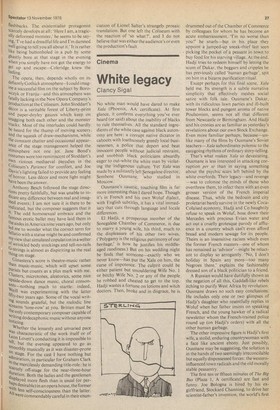Cinema
White legacy
Clancy Sigal
No white man would have dared to make Xala (Phoenix, AA certificate). At first glance, it confirms everything you've ever heard (or said) about the inability of blacks to rule themselves. All the standard ingredients of the white case against black autonomy are here: a corrupt native dictator in cahoots with loathsomely greedy local businessmen, a police that deport and beat innocent people without judicial restraint, and snobbish black politicians absurdly eager to out-white the white man by violating the indigenous culture. Yet Xala was made by a militantly left enegalese director, Sembene Ousmane, who studied in Moscow.
Ousmane's caustic, touching film is far more interesting than I dared hope. Though it's in French and his own Woluf dialect, with English subtitles, it has a vital immediacy that cuts through language and locale differences.
El Hadji, a prosperous member of the Senegalese Chamber of Commerce, is due to marry a young wife, his third, much to the displeasure of his other two wives. (`Polygamy is the religious patrimony of our heritage,' is how he justifies his middleaged randiness.) But on his wedding night he finds that someone—exactly who we never know—has put the Xala on him, the curse of impotence. The culprit could be either patient but smouldering Wife No. 1 or bitchy Wife No. 2 or any of the people he robbed and cheated to get to the top. Hadji wastes a fortune on lotions and witch doctors. Then, broke and in disgrace, he is
drummed out of the Chamber of Commerce by colleagues for whom he has become an acute embarrassment. 'I'm no worse than you!' he snarls—but in his place they appoint a jumped-up sneak-thief last seen picking the pocket of a peasant in town to buy food for his starving village. At the end, Hadji tries to redeem himself by letting the scum of Dakar, the beggars and cripples he has previously called 'human garbage', spit on him in a bizarre purification ritual.
Except perhaps for this final scene, Xala held me. Its strength is a subtle narrative simplicity that effectively meshes social satire with folk tale. Ousmane's Dakar, with its ridiculous lawn parties and ill-built tower blocks and pungent aroma of native Poulsonism, seems not all that different from Newcastle or Birmingham. And Hadji and his cronies are as familiar as yesterday's revelations about our own Stock Exchange. Even more familiar perhaps, because—unlike many of the films by Ousmane's Soviet teachers—Xala subordinates polemic to the easygoing rhythms of ordinary story-telling.
That's what makes Xala so devastating. Ousmane is less interested in attacking corruption per se than in saying something about the psychic scars left behind by the white overlords. Their legacy—and revenge —was to colonise the minds of those who overthrew them, to infect them with an even grosser version of the French imperial disease. Thus, while the bedouin and city proletariat barely survive in the newly CocaColaised economy, Hadji and Co haughtily refuse to, speak in Woluf, hose down their Mercedes with precious Evian water and act out a cruelly grotesque parody of affluence in a country which cari't even afford bread and modern sewage for .its people. Theirs is an insensitive racism which even the former French masters--one of whom has remained as 'advisor'—might be reluctant to display so arrogantly. 'No, I don't holiday in Spain any more—too many Negroes there,' explains the fashionably dressed son of a black politician to a friend.
A Russian would have dutifully shown us the negation of all this, Gaddafi-like rebels itching to purify West Africa by revolution. Ousmane draws no such easy conclusions. He includes only one or two glimpses of Hadji's daughter who resentfully replies in Woluf when her father insists on speaking French, and the young hawker of a radical newsletter whom the French-trained police round up (on Hadji's orders) with all the other human garbage.
The other impressive figure is Hadji's first wife, a stolid, enduring countrywoman with a face like ancient ebony. Just possibly, Ousmane may be suggesting, the solution is in the hands of two seemingly irreconcilable but equally dispossessed forces: the westerninfluenced town radicals and the old morally stable peasantry.
The first ten or fifteen minutes of The Big Bus (Plaza 1, A certificate) are fast and funny. Joe Bologna is hired by his exgirlfriend, Stockard Channing, to drive her scientist-father's invention, the world's first
nuclear-powered bus. Jose Ferrer, an oil company hireling who lives in an iron lung, plans to destroy the bus. The script runs out of gas and coasts lazily downhill once the New York-to-Denver trip actually starts. But in general it's a nice spoof on Juggernaut. Airport 75 and other disaster epics.
I used to know a girl in Greenwich Village who had an orgasm every time she travelled in a lift, had a warm bath or walked into a steam-heated room. Recognising her condition as medical, she went to doctors about it. Sylvia Kristal in Emmanuelle 2 (Casino, Eros, ABCs, X certificate) climaxes over acupuncture needles, tattooed men and Hong Kong geishas—but instead of seeing a doctor talks salaciously to her voyeuristic drip of a husband about it. Though cruder porn than its wildly successful predecessor, Emmanuelle 2 is still risible as an unintentional parody of ultra-romantic films like Lelouche's A Man and a Woman. My favourite character is the half-English adventurer who spends his days lovingly polishing an airplane propeller with which he sleeps at night.



































 Previous page
Previous page